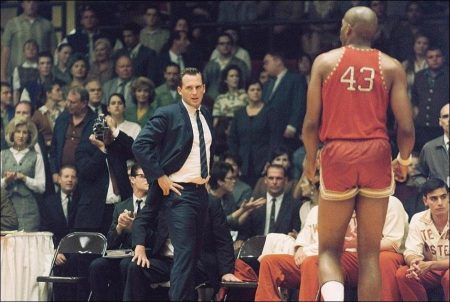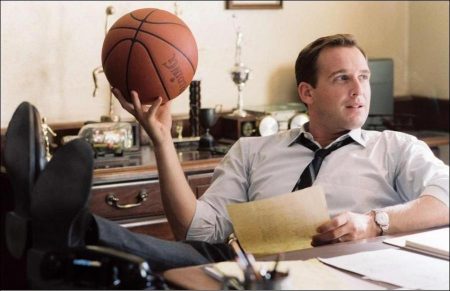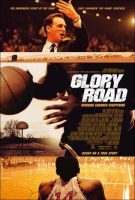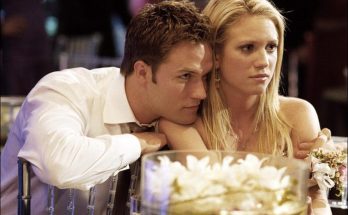Tagline: Winning changes everything.
For Don Haskins, the dream was always about winning: winning with guts, heart and grit; winning with self-respect; and winning even when the odds were completely stacked against you. What Haskins didn’t know in 1966—when he was just a small-town family man trying to make an indelible mark in his first job as a collegiate basketball coach—is that his underdog team’s incredible victory would transcend sport and change not only his life and the lives of his players, but the country itself.
Haskins and his scrappy Texas Western Miners were unwittingly about to revolutionize basketball and the American landscape. It was still a time of innocence in the United States, yet the country was on the verge of major social changes when Haskins decided to play an all-African-American opening lineup at the NCAA championships against the all-white juggernaut of the University of Kentucky Wildcats.
Haskins did it to win. But his bold decision would help break down barriers of segregation that affected every segment of society and set a new course for the future as his team did the one thing they could to prove themselves to a watching world: they played their hearts out.derworld Evolution, delivering a veritable feast of bloodthirsty power, forbidden love and sweeping vengeance.
The Coach: Josh Lucas as Don Haskins
The heart of GLORY ROAD is the story of the unstoppable drive and courage of Don Haskins—so it was key from the beginning to find the right young actor to portray the green but passionately ambitious coach whose love of winning spurred major changes in the game of basketball and the equality of college sports.
The filmmakers unanimously agreed that Josh Lucas, the rising young star who came to the fore in “A Beautiful Mind” and “Sweet Home Alabama” and who has appeared most recently in such films as “Stealth” and “An Unfinished Life,” had a palpable connection to the essence of Haskins—his ability to be at once intimidating, demanding, merciless and also incredibly inspirational.
Says Jerry Bruckheimer: “Josh Lucas was the right man to play Don Haskins. There is an intensity to him and, most importantly, he knows how to motivate other actors and he threw himself into the role with complete devotion.”
Director James Gartner adds, “From the very beginning, Josh was sensitive to what he needed to do to bring Don Haskins to life on screen. An actor must bring their individual personality to a role, and Josh did a fabulous job making this character his own.”
Lucas was stunned when he learned the story of GLORY ROAD and was moved by Haskins’ role in it. “I don’t think a lot of people realize that basketball was so segregated until this point,” says the actor. “There were basically all-black leagues and all-white leagues. If it was an integrated team, then the couple of black players sat on the bench most of the time. In this atmosphere, Texas Western beating Kentucky was more than just a game—it was a turning point in society and an exciting moment in history most people know very little about.”
He continues, “The cool thing about Haskins is that he was basically color-blind. He never understood why white players couldn’t play against black players and vice versa. It made no sense to him. He just wanted to find the best players he could recruit—no matter who they were or where they were from, as long as they had that potential. It was as simple as that to him.”
Lucas dove headlong into Haskins’ life and times, researching every possible aspect of life in 1960s Texas. His trailer on the set was lined with more than 700 pictures of Haskins, the team as well as general news clippings from the era. Lucas even gained thirty-five pounds during production to better emulate the famously bear-like body type of Haskins during his coaching days. “Haskins was addicted to basketball, so I knew if I was going to play him successfully, I had to start sharing that philosophy,” the actor says of his approach.
To further get into the role, Lucas began coaching the other cast members during their intensive basketball practices, running drills on the court with no mercy just as Haskins once did. He knew he had to assert his authority over the team even before the cameras started rolling—even if it meant temporarily getting tough with his fellow actors.
But the softer side of Haskins comes out in his home life with his children and his wife, Mary, who always believed in him and spurred him towards the greatness he achieved. To play Mary, the filmmakers chose Emily Deschanel, the star of Fox’s new series “Bones” and whose film credits include “Cold Mountain” and “Spider-Man 2.”
Says Deschanel, “Mary and Don had such a unique relationship, and to this day you can still see the softness and warmth between them. Throughout the film you can see Don being the disciplinarian coach that he was, but he wasn’t that tough when he came home. I think every person needs someone in their life to keep them humble and grounded. That is what Mary did for Don.”
Ultimately, Lucas says that Haskins has become the most complex and interesting character of his screen career. “I loved playing Don because there’s so much duality to him. He was complex, intimidating, rip-roaringly funny and honest to a fault. He could spew rattlesnake venom but at the same time he was this totally generous bear of a personality who was gracious with everybody. Don Haskins is a figure of mythic status, not just in El Paso, but around the world, and I feel really proud and honored to have had this chance to play him.”
Executive producer Andy Given, who knows Don Haskins personally, was especially impressed by Lucas’ performance. “Having grown up with the Haskinses and having spent time with Don and his sons in my childhood, I have to say I think Josh Lucas nailed the part. It was uncanny.”
The Star Player
Bobby Joe Hill, the feisty guard from Detroit who helped lead his Texas team to a historic victory in 1966, was once called by Don Haskins the greatest competitor he ever knew. To portray the star player, who was also coined “Rebel” by his teammates, the filmmakers turned to one of today’s most promising new screen stars, Derek Luke, who won widespread acclaim for portraying the inspiring title role in “Antwone Fisher.”
Luke was immediately drawn to the role—and to the idea of playing a young man who demonstrated true passion in life both on and off the court. “Bobby Joe’s fun-loving spirit and confidence shined no matter what he did. That is what made him such an amazing player and also makes him such a great character,” he says. “I loved the story of GLORY ROAD because it’s about so much more than basketball. It’s about the lives of the coach and the players and it’s about finding that potential to go beyond what you thought was possible.”
Luke was also acutely aware of how very different times were for an African- American basketball player attending college in the South in the mid 1960s. “The truth is that Bobby Joe truly thought Don Haskins was fibbing when he asked him to be one of the starters for the Miners,” notes Luke. “In those days black players spent a lot of the time on the bench; they weren’t allowed to express themselves on the court. And to think that a coach wanted him to come to Texas and be the number-one ball handler on the team? You have to understand, that was an incredible dream come true for Bobby Joe. He understood what it meant.”
Though Luke had never played basketball seriously before being cast as Hill, he immediately went into crash training, spending sweat-soaked hours day and night working on his free throws and footwork—and demonstrating an intensity and focus he seemed to share with his character. “In a way, I thought of this movie as almost an action film, in that I knew I would have to commit just as much physically as I did emotionally,” he explains. “That was the real challenge.”
On the set, Luke’s depth of devotion to his character, the game and the story’s resonance in today’s world became an inspiration to everyone. “Nobody has heart like Derek Luke,” says director Gartner. “He brought himself fully to this role.”
The Rival
When Don Haskins and his team made it to the NCAA championships, they knew they were about to face down the toughest possible opponents—the highest-scoring team in the nation and four-time national champions, the University of Kentucky Wildcats, and their equally driven coach, Adolph Rupp. Rupp had developed a reputation for being brash, arrogant, ruthless and nearly unbeatable. Though he passed away years ago, Rupp remains a controversial figure whose role in basketball’s segregation is still debated.
In the original GLORY ROAD script, the character of Rupp had only a few lines of dialogue but once Academy Award-winning actor Jon Voight was cast in the role, and demonstrated an uncanny mastery of Rupp’s unique personality, the part was expanded. Bruckheimer states, “I believe Jon Voight listened to hundreds of hours of tape on Rupp. As he did in ‘Ali’ with Howard Cosell and with Franklin D. Roosevelt in ‘Pearl Harbor,’ he became an expert at copying mannerisms and voice patterns, bringing Adolph Rupp fully to life.”
Adds one of the film’s basketball consultants, Tim Floyd, “I think the people in Kentucky are going to be knocked out when they see Voight’s dead-on portrayal of Rupp.”
There are still unanswerable questions about Rupp’s true personal beliefs, but Voight was determined to play the character with veracity. Says James Gartner, “Jon handled the part of Rupp with great sensitivity. It is still a big question mark what Rupp’s feelings were towards black basketball players playing in white schools and we may never know. Yet Voight captured the essence of Rupp as a coach in every look and gesture. That was what we needed.”
For Voight, accuracy was the aim. “I felt a responsibility to represent Adolph Rupp as he was in that moment,” he says. “He was one of the greatest coaches of our lifetime, and many admired his skills despite what was thought about his social views. He was also part of this great story in which Don Haskins shows that sometimes we do big things in life and don’t realize the importance at the time. And that is greatness.”
Voight made the decision to stay in character on set the entire time, which only added to the high-wire atmosphere when shooting the championship game. Recalls Josh Lucas: “When I realized that Voight was going to be Rupp at all times, I decided I would look right back at him as Haskins. That really set the tone of true tension that existed between these two world-class coaches.”
These production notes provided by Walt Disney Pictures.
Glory Road (2006)
Directed by: James Gartner
Starring: Josh Lucas, Derek Luke, Jon Voight, Austin Nichols, Emily Deschanel, Evan Jones, Alphonso McAuley, Mehcad Brooks, Damaine Radcliff, Mitch Eakins, Al Shearer
Screenplay by: Christopher Cleveland
Production Design by: Geoffrey Kirkland
Cinematography by: Jeffrey L. Kimball, John Toon
Film Editing by: Jason Hellmann, John Wright
Costume Design by: Alix Friedberg
Set Decoration by: Dorree Cooper
Art Direction by: Kevin Constant
Music by: Trevor Rabin
MPAA Rating: PG for racial issues including violence and epithets, momentary language.
Distributed by: Buena Vista Pictures
Release Date: January 13, 2006
Visits: 59





